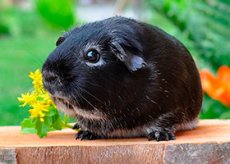New publications
Not all pets are safe
Last reviewed: 02.07.2025

All iLive content is medically reviewed or fact checked to ensure as much factual accuracy as possible.
We have strict sourcing guidelines and only link to reputable media sites, academic research institutions and, whenever possible, medically peer reviewed studies. Note that the numbers in parentheses ([1], [2], etc.) are clickable links to these studies.
If you feel that any of our content is inaccurate, out-of-date, or otherwise questionable, please select it and press Ctrl + Enter.

If your child asks you to buy him a guinea pig, think about it - scientists say that this animal can be dangerous.
Doctors from Holland reported that it is guinea pigs that are capable of spreading pathogenic bacteria that cause a lethal form of pneumonia.
The microorganisms are called Chlamydia caviae – sometimes these bacteria cause conjunctivitis in the rodents themselves. Previously, it was believed that such microbes did not pose a danger to people. Until three patients with acute pneumonia that developed after contact with guinea pigs were hospitalized in the Netherlands. Tests taken from the patients confirmed the fears: Chlamydia caviae was found in them.
Two patients were in extremely serious condition and had to be put on artificial ventilation. Only the use of strong antibiotics allowed all three patients to be cured.
"Previously, there were no suspicions about these bacteria. However, now we are forced to warn doctors and veterinarians - there is a danger. Now we know for sure that the microbe can pass from rodent carriers to humans. In addition to guinea pigs, rabbits, horses and dogs can be carriers," said Professor Bart Ramaekers, an employee of the Beethoven Hospital.
Expert specialist Steven Gordon, head of one of the departments of the Cleveland Clinical Center (Ohio), confirms: all such cases should remind people that they must not forget about the rules of hygiene in relation to pets. "Safety is the first priority, especially if the pet owner has a weakened immune system," the expert adds.
The cases of the diseases mentioned above did not occur simultaneously, but over the course of three years. The patients were a man and two young women. Two patients were infected by rodents that they kept at home - the presence of a pathogenic microorganism was later detected in the pigs. The sick man had two rodents at home, and one of the patients had more than 20. The second victim, a woman, worked in veterinary medicine, so she became infected while caring for guinea pigs.
Doctors found the bacteria in a sputum analysis. As experts point out, not all rodents are carriers of the infection – for example, the pathogenic microbe was isolated from 59 of the 123 pigs examined. This means that the risk is too great.
"It is quite possible that there have been and are many more cases of infection. It's just that patients who are admitted with acute pneumonia are immediately given complex antibiotic therapy, without specifying the cause of the disease," the doctor suggests. At the same time, the professor clarifies that only people with weakened immunity are at risk, so it is unlikely that you should get rid of your beloved pet as soon as possible. The main thing is to follow hygiene rules when caring for a rodent. "If you do not want to get sick, then try to regularly consult and show your pet to a veterinarian. You should be especially wary if the rodent suffers from conjunctivitis or respiratory diseases - such an animal should be shown to a veterinarian immediately," the doctor explains.
Details can be read in a recent issue of the New England Journal of Medicine.
 [ 1 ]
[ 1 ]
